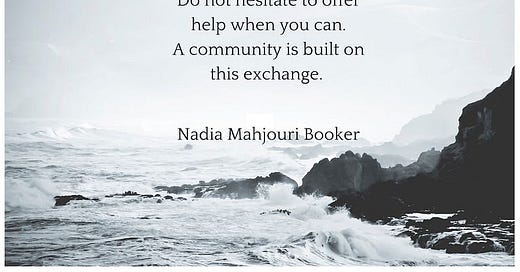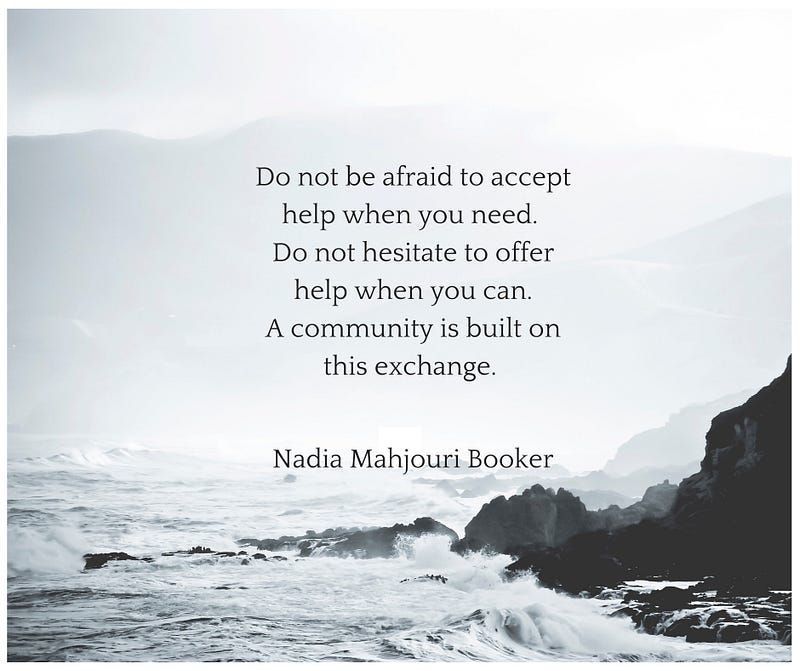The Gifts of Being Just a Little Bit Broken: How Asking for Help Builds Community
This week I’ve had to accept help. And worse than that, I’ve had to ask for it; I’ve been bed bound after major surgery.
This week I’ve had to accept help. And worse than that, I’ve had to ask for it; I’ve been bed bound after major surgery.
And, the truth is, it’s hard. It’s hard to say ´I can’t do this’. It’s hard to tell people that you won’t be able to meet the commitments you have taken on. It’s hard to ask for food, for tea, for a hug, for space, or for help doing the things you normally do without thinking twice, like picking up the kids from school, or feeding my family.
It shouldn’t be hard – I have family around me: healthy, available parents, a loving husband, adult children and a sisterhood of beautiful women who I trust with my life. I live in a community that is close knit and generous, and I am super well connected to the local school community which my kids attend, just around the corner from our home.
Even more, I happen to run a community Facebook group in my suburb called the Good Karma Network, a group of over 1600 people, with the explicit aim of encouraging members to ask for help from each other. I am always offering help to people that ask in that group, regularly encouraging people on my neighborhood to reach out to their community, to ask for what they need.
So why then, when it’s my turn to receive, instead of to give, is it so much harder? Why do I give without restraint but accept only reluctantly, tentatively and with restraint?
Perhaps, it’s ego – I prefer to consider myself helpful rather than helpless. Perhaps it’s pride – I’ve always been taught to never to show weakness, no matter how hard things are, you just keep going. I know in my childhood a day off school was only for the most severe of illnesses, and I took them infrequently. Indeed, I was so tough that a doctor once told me, around age 8 or 9 that I had the constitution of an ox. He had seen my horrifically infected tonsils, which I hadn’t mentioned to him or my parents. The only took me to see him when I started vomiting and could no longer stand up. My throat did hurt, of course, agonisingly, but I didn’t know it was ok to say ‘this hurts – I need help’. I just doubled down, and toughed it out, alone. I wasn’t going to be a whinger.
But what I didn’t know then was that those words – it hurts, I need help – were not signs of weakness but of strength. And more than that, they are the key to building connection, trust and community.
As Brené Brown writes in Daring Greatly: How the Courage to Be Vulnerable Transforms the Way We Live, Love, Parent, and Lead “Vulnerability sounds like truth and feels like courage. Truth and courage aren’t always comfortable, but they’re never weakness.”
Being vulnerable, which is inherent in asking for help builds trust. When you ask for help, you are telling someone: I trust you with this, I trust you to see me like this. I am not hiding from you, and I respect your capacity to help. And more, I believe you are the kind of person that will help me if you can and be honest with me if you can’t.
Asking for help is sharing yourself, and it is they way in which people come to trust each other – a request for help is an opportunity to deepen connection. I know that the relationships that feel right are the ones that feel balanced, that have give and take, that are not one sided. Asking for help when you need it allows reciprocity to develop, and reciprocal relationships are the foundation of community. Allowing my community to have my back not only feels great, it also strengthens the bonds of that community, it encourages others to ask for help too, it makes us all more closely connected and makes us all feel better, safer and more deeply loved.
So, I’m not going to second guess it anymore, I’m putting up my hand when I need help and bravely asking. Because I know that when I ask for what I need, I give others the courage to do the same, and in the end, that’s what community is all about.




